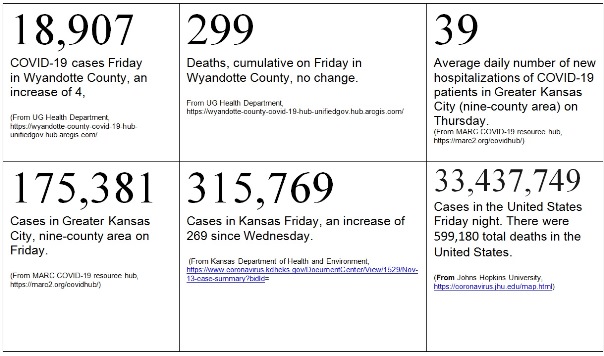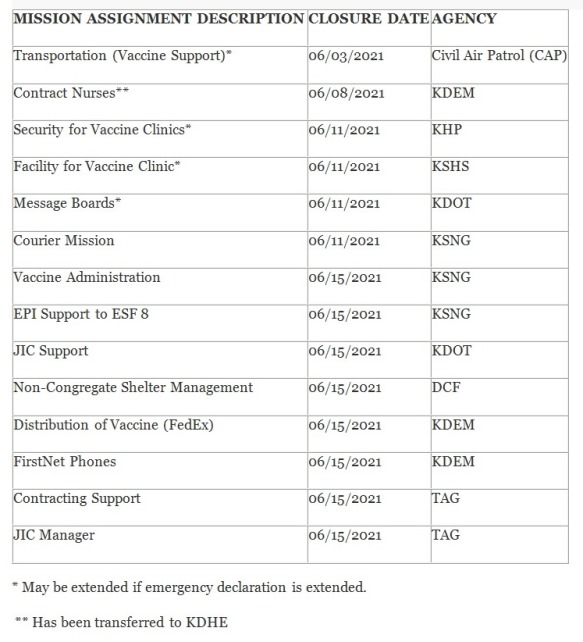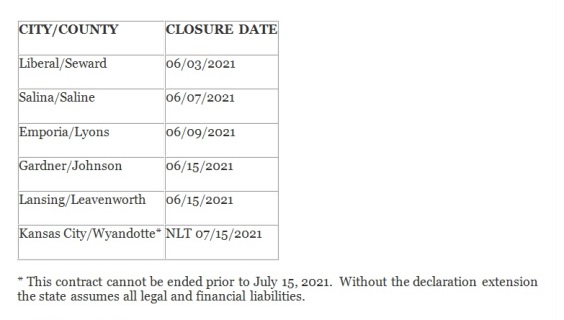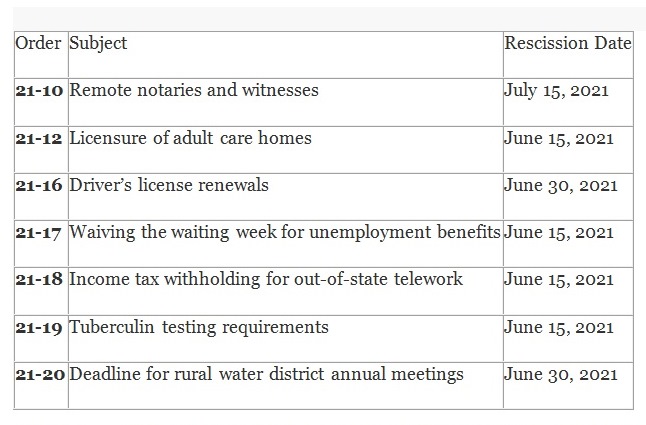
Gov. Laura Kelly is urging the Legislative Coordinating Council to extend the disaster declaration to July 15.
In a letter to Senate President Ty Masterson, Gov. Kelly stated that she wanted the state to get to the fall and to the start of the school year to make sure that vaccine efforts are not stalled or impeded.
She presented a plan with goals to be completed by Aug. 30. The disaster declaration would have to be extended to accomplish the goals, according to the letter.
Some of the goals include continued vaccination of schoolchildren 12 and over before school starts in the fall; continuation of the Kansas Division of Emergency Management in distributing the vaccine through mobile clinics, including some at large employers in the state; delivering personal protective equipment, supplies and equipment to hospitals and counties; and continuing to test adult care homes and underserved populations.
Also, the letter stated that the federal emergency response funding the state receives could be imperiled if the disaster declaration expires. Agencies such as the Civil Air Patrol and Kansas Highway Patrol could no longer be assigned to be part of the state response.
Also, the emergency allotment of SNAP (food) benefits from the federal government to states could be lost. About 63,000 Kansas households could be affected by the loss of this financial support, costing $14.5 million to vulnerable Kansans.
The text of the governor’s letter:
The following is a letter from Gov. Laura Kelly urging Senate President Ty Masterson and members of the Legislative Coordinating Council to extend the current State of Disaster Emergency Declaration.
President Masterson,
On May 24, 2021, I submitted my first application for a 30-day extension of the COVID-19 state of disaster emergency to the Legislative Coordinating Council (“LCC”) pursuant to Senate Bill 40’s amendments to the Kansas Emergency Management Act (“KEMA”). K.S.A. 48-924(b)(3). Please consider this letter my specific application to extend the COVID-19 state of disaster emergency up to and including July 15, 2021.
While these conversations took place back in March, I do want to point out that my Chief of Staff discussed with legislators during session that the objective has been to get to the fall of 2021 and the start of the new school year to ensure that vaccine efforts are not stalled or impeded. To build on those conversations, I am including with this specific application an outline of the current plan regarding the State Emergency Operations Center (“SEOC”) and a timeline for demobilization of those efforts. This plan will include the following components:
• Priorities and objectives to be completed by August 30, 2021;
• SEOC COVID-19 activities closure timeline;
• Rescinding or sunsetting of current executive orders based on the priorities and objectives to be achieved by August 30, 2021.
The plan I present to you in this application continues to reduce the number of activities and pandemic emergency executive orders as we move closer ending the emergency declaration. Ultimately, this plan will require extensions from the LCC to August 30, 2021 as outlined below.
Priorities and Objectives to be Completed by August 30, 2021
There are several priorities that continue to need the attention of the State of Kansas and that require an extension of the state of disaster emergency declaration. First, we need to continue efforts to vaccinate school-aged children to allow schools to resume normal activities beginning this fall. As of June 11, 2021, Kansas has vaccinated 48,045 (20.1%) of children age 12-17. Based on current projections, we anticipate being able to have between 100,000 (42%) to 118,000 (49%) of this age group vaccinated by the end of August. There was a notable decline in the rate of children vaccinations as school ended for the summer. Vaccination efforts planned around the back to school period of early to mid-August will greatly increase the rate of vaccinations for this age group.
Second, we need KDEM to continue to support the distribution and administration of the COVID-19 vaccine through our mobile clinics. The Kansas National Guard (“KSNG”) has administered 122,323 vaccines with 4,360 of those being administered since May 28, 2021. These efforts are directly tied to Executive Order 21-21 through the use of contract nurses who are able to perform vaccinations more easily under the order’s provisions. These contract nurses have delivered 45,981 vaccines across the state of Kansas. We continue to receive requests from employers to do onsite vaccination clinics, which is important to continue to vaccinate the workforce. To date, we have completed vaccine clinics at 47 employer locations across the state. The total number of employees who have had the opportunity to get vaccinated through this employer-partnership exceeds 40,000 Kansans. And, as of the writing of this letter, there are an additional 12 employers who have requested vaccination clinics for their nearly 5,000 (total) employees that are being scheduled. We have an additional 20 community vaccination clinics already scheduled between June 12 and July 27, 2021.
Third, we continue to receive resource requests from counties and hospitals that need to be fulfilled. We have received 5,090 resource requests for personal protective equipment (PPE), supplies, personnel and equipment. We have delivered 114,234 cases of PPE through these requests. Since May 28, 2021, there have been 26 requests, totaling 28,976 cases of PPE. Some of this equipment, such as ventilators, will need to be returned, inventoried, and receive maintenance work. Having a scheduled ramp-down will give counties and hospitals time to plan and understand that these resources will become unavailable after August 30th.
Fourth, as outlined below regarding executive orders, we need to continue requiring testing at our adult care homes and underserved populations. KSNG has tested over 30,603 individuals and transported over 26,304 samples to Kansas Health and Environment Laboratory (KHEL) with 297 of those samples since May 28, 2021. While these efforts will ultimately become part of KDHE’s normal operation, we need to continue to support these efforts through August 30th.
Without a disaster declaration in place, these priorities and objectives cannot be effectively accomplished. As you know, aside from removing the legal basis for conducting much of these efforts, the federal emergency response funding Kansas receives may be immediately imperiled if the disaster declaration expires. Pursuant to KEMA, the Adjutant General loses his authority to mission assign agencies such as the Civil Air Patrol, Highway Patrol, and others as part of the state response. These agencies do not have liability protection for work conducted in these efforts absent the emergency declaration.
Additionally, some of our most vulnerable Kansans would lose the emergency allotment of SNAP benefits the federal government provides to states with active COVID-19 emergency responses. Approximately 63,000 Kansas households would be affected by a loss of this additional financial support, and a total of around $14.5 million in additional benefits to those vulnerable Kansans and to our economy would be lost. While many of the elements of our emergency response from last summer are no longer essential, the disaster declaration itself is still essential.
SEOC COVID-19 Activities Closure Timeline
While there are certain activities that need to continue as described above, the list below indicates the mission assignments and activities that have been closed and which ones would be re-opened under an extension of the emergency declaration.
Mission Assignments

- May be extended if emergency declaration is extended.
** Has been transferred to KDHE
Non-Congregate Shelters and Supporting Contracts

Food & Commodities

Rescinding or Sunsetting Executive Orders
Our administration has worked diligently to enable our state to responsibly pare down the number of pandemic emergency executive orders in place since the beginning of 2021. As of today, only nine pandemic executive orders remain in effect. In my May 24, 2021 application to extend the disaster declaration, I stated that in the weeks and months to come I would consider rescinding additional executive orders. In that continued effort, on June 14, 2021, I will issue an order rescinding all but two of the nine remaining pandemic executive orders. Orders will be rescinded as follows:

The two executive orders I do not intend to rescind at this time are 21-15 and 21-21. Executive Order 21-15 is the only mechanism in place to require COVID-19 testing in certain adult care homes licensed by the state. Without this order in place, the state’s ability to ensure the health and safety of staff and residents at such adult care homes will be severely compromised. Executive Order 21-21 grants temporary authority to certain medical personnel to administer COVID-19 vaccinations. Continued efforts to vaccinate as many Kansans as quickly as possible will be unnecessarily impeded if it expires.
The time to conclude our emergency response to the COVID-19 pandemic under KEMA and to transition to a new normal for dealing with COVID-19 through standard authorities is approaching, but that time has not yet arrived. At the LCC’s May 28, 2021 meeting, some LCC members indicated that they wanted to see a plan for how we wind the emergency response down and return to normal. Our administration has now provided that plan. It will take until August 30, 2021, to execute it.
As circumstances have changed, we have transitioned to an emergency response that has been trimmed down to vaccination efforts, logistical support to local communities, finishing an orderly return to normal in state agencies, and securing federal financial support for our efforts. While COVID-19 could become an ever-present threat to public health if vaccination rates continue to decline, our emergency response will not be permanent. We owe it to Kansans to finish the job and wind down the state of disaster emergency responsibly.
As with the LCC’s previous meeting to consider an extension, at next Tuesday’s meeting Major General Weishaar, Dr. Norman, and members of my staff will be present to answer any questions the LCC may have.
Sincerely,
Laura Kelly
Governor
CC: Representative Ron Ryckman, Speaker of the House of Representatives
Senator Rick Wilborn, Vice President of the Senate
Senator Larry Alley, Senate Majority Leader
Senator Dinah Sykes, Senate Minority Leader
Representative Blaine Finch,
Speaker Pro Tem of the House of Representatives
Representative Dan Hawkins, House Majority Leader
Representative Tom Sawyer, House Minority Leader
Gordon Self, Revisor of Statutes
Special COVID-19 vaccination clinic scheduled at soccer match
2 p.m. Saturday, Children’s Mercy Park – All fans with tickets and eligible fans in attendance may get a free COVID-19 vaccine until match halftime at Sporting KC match at 2 p.m. at the Mazuma Plaza at Children’s Mercy Park. Fans who get a vaccine shot at the match will receive a free Sporting KC scarf. The clinic is in partnership with the Unified Government Health Department. For information, see https://www.facebook.com/UGHealthDept/photos/a.194105150632410/4228002737242611/.
Free walk-in vaccinations available
The Kansas National Guard Armory, 100 S. 20th, (near 18th and Ridge), will be open for free walk-in vaccinations for everyone 18 and older from 9 a.m. to 2:30 p.m. Saturday, June 12. The vaccines are through the Unified Government Health Department.
There are now expanded bus routes to the Saturday clinic at the Armory. Bus routes 102, 103 and 118 provide service to the Armory every 30 minutes on Saturdays. There is a special transfer stop between Route 106 and Route 118 at 18th and Quindaro on Saturdays.
People may also schedule vaccinations at WycoVaccines.org. Residents may request rides to the vaccination clinic through a form on the same website.
The Unified Government Health Department vaccination hours changed recently. To see the schedule and more information about vaccinations, visit WycoVaccines.org or https://www.facebook.com/UGHealthDept.
Those who receive COVID-19 vaccinations are asked to consider bringing an ID to make the process go faster.
The Health Department is doing more mobile COVID-19 vaccinations, and people may request vaccines to be given at different sites in the community by going to WycoVaccines.org and clicking on “mobile vaccine request.” People also may request a ride to vaccination sites on the same page.
Those who wish to schedule an appointment may use the Health Department’s self-scheduling tool at WycoVaccines.org and click on a blue button that says, “Click here to schedule an appointment online.” The page is available in Spanish by clicking at the top of the page. Walk-in appointments also are welcome.
Those who don’t have an internet connection may call 3-1-1 or 913-573-5311 for assistance in scheduling their vaccination appointment time and date.
To see more information about Health Department vaccinations and next week’s schedule, visit WycoVaccines.org.
Other sites available for vaccinations
Vaccinations at KU Health System are open to the public. Current patients may use MyChart to make an appointment. Others may call 913-588-1227 or visit kansashealthsystem.com/vaccine to make an appointment to get vaccinated. KU Health System currently is vaccinating residents of Kansas and Missouri who are 12 or older, by appointment only. Those under 18 must be accompanied by a parent or guardian throughout the appointment.
There are also pharmacies giving free COVID-19 vaccinations in Wyandotte County by appointment, when available. These include Price Chopper and Hen House pharmacies, which are now also accepting walk-in vaccinations or appointments, and are starting vaccinations for age 12 and up at those pharmacies that are giving Pfizer vaccine (see https://www.ballsfoodspharmacy.com/).
CVS has announced walk-in appointments for COVID-19 vaccine at some of its stores. Those interested in getting a vaccination at a CVS pharmacy are asked to visit a CVS website in order to make sure there is vaccine available. The website is at www.cvs.com/. Walgreens and Walmart also were listed on www.vaccines.gov as giving vaccinations.
Other pharmacies and sites giving vaccines are listed at www.vaccines.gov. The website also tells whether vaccines are in stock at the locations.
Case numbers reported
Dr. Dana Hawkinson, medical director of infection prevention and control, reported the COVID-19 case numbers at the University of Kansas Health System were slightly lower Friday morning. Five active COVID-19 patients were being treated at the hospital, a decrease of one. Three patients were in the intensive care unit, an increase of two from Thursday. One patient was on ECMO life support, a 54-year-old patient with no other medical problems who is not vaccinated. Four other patients were still in the hospital, in the recovery phase, the same number as Thursday. There were nine total COVID-19 patients, a decrease of one since Thursday.
Wyandotte County reported an increase of four COVID-19 cases on Friday, June 11, for a cumulative 18,907 cases, according to the Unified Government Health Department’s COVID-19 webpage. There was a cumulative total of 299 deaths reported, no change from Thursday.
The Mid-America Regional Council’s COVID-19 dashboard reported 175,381 cumulative COVID-19 cases on Friday in the Kansas City region. The daily average of new hospitalizations was 39.
The Kansas Department of Health and Environment reported 315,769 cumulative COVID-19 cases in Kansas on Friday, June 11, an increase of 269 cases since Wednesday, June 9. There were a total of 5,106 cumulative deaths reported statewide, an increase of three.
On Friday, June 11, the KDHE reported 59,411 cumulative cases in Johnson County, an increase of 38 cases since Wednesday. Leavenworth County had 7,286 cumulative cases, an increase of 12 since Wednesday. Sedgwick County had 57,550 cases, an increase of 38 cases since Wednesday, according to KDHE.
The Johns Hopkins University COVID-19 dashboard on Friday night reported 33,437,749 cumulative COVID-19 cases in the United States, with 599,180 total deaths reported nationwide. There were 14,417 new cases nationwide and 428 new deaths nationwide.
States with high numbers of new cases were Texas, 1,784; California, 1,347; Washington, 717; Missouri, 675; and Pennsylvania, 668.
Countries with high numbers of new cases were India, 92,291; Brazil, 88,092; Colombia, 31,656; Argentina, 27,628; and U.S., 14,417, according to Johns Hopkins information.
Free testing available
Free COVID-19 testing will be offered from 10 a.m. to 3 p.m. Saturday, June 12, at St. Patrick’s gym, 1086 N. 94th St., Kansas City, Kansas.
Free COVID-19 testing also will be offered from 9 a.m. to 2:30 p.m. Saturday, June 12, at the Kansas National Guard Armory, 100 S. 20th St., (near 18th and Ridge), Kansas City, Kansas, at the Health Department’s eastern location.
Wyandotte County residents may contact the Health Department at wycohelp.org to sign up for a test to be delivered to their home.
For more details about free COVID-19 testing offered by the UG Health Department, visit https://wyandotte-county-covid-19-hub-unifiedgov.hub.arcgis.com/pages/what-to-do-if-you-think-you-have-covid-19, https://www.facebook.com/UGHealthDept or call 3-1-1.
The Health Department’s general contact page is at https://www.wycokck.org/Health/Contact.aspx. The department’s Facebook page is at https://www.facebook.com/UGHealthDept.
Testing sites are at https://wyandotte-county-covid-19-hub-unifiedgov.hub.arcgis.com/pages/what-to-do-if-you-think-you-have-covid-19. There are more test sites listed on this page.
Saliva testing is now offered at the UG Health Department. For more information, visit https://alpha.wycokck.org/files/assets/public/health/documents/covid/02042021-ugphd-saliva-testing-available.pdf.
The University of Kansas Health System COVID-19 update page is at https://www.facebook.com/kuhospital/videos/330310795391910.
A vaccine report for the state of Kansas is at
https://www.kansasvaccine.gov/DocumentCenter/View/123/Vaccine-Historical-Document-22521?bidId=.
The KDHE’s COVID-19 webpage is at https://www.coronavirus.kdheks.gov/.
The KC Region COVID-19 Hub dashboard is at https://marc2.org/covidhub/.
The Wyandotte County page on the Johns Hopkins COVID-19 website is at https://bao.arcgis.com/covid-19/jhu/county/20209.html.
The Johns Hopkins Data in Motion, a presentation on critical COVID-19 data in the past 24 hours, is at https://coronavirus.jhu.edu/covid-19-daily-video.
